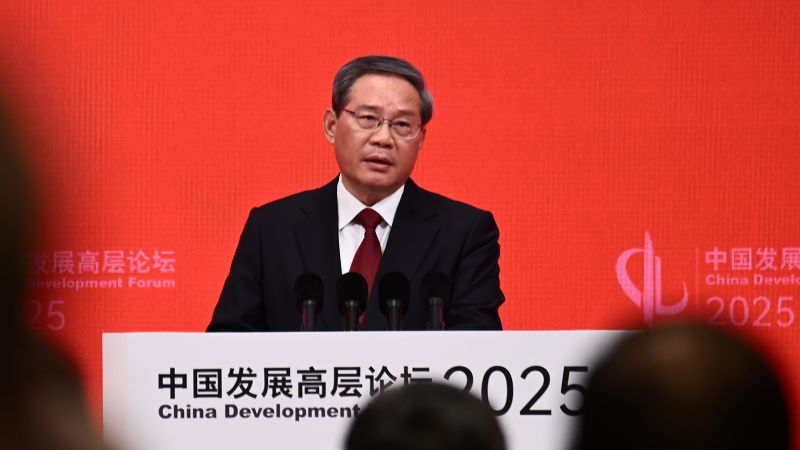
China Urges Global Unity Against Protectionism at Beijing Business Forum
In the ever-evolving landscape of international trade, one of the most pressing challenges has been the rise of protectionist policies. At the recent Beijing Business Forum, key Chinese leaders made a definitive call for global unity to counter these protectionist tendencies. This appeal highlighted the necessity for international collaboration as economies worldwide navigate the complexities of post-pandemic trade.
The Significance of the Forum
The Beijing Business Forum, a prominent gathering of business executives and policy makers, has become a critical platform for discussing global trade and economic policy. This year, the forum emphasized the urgent need for a cooperative approach to trade in the current international climate. As protectionism becomes a growing concern, the consensus at the forum was clear: open markets and bilateral cooperation are essential for sustained global economic growth.
China's leading role in the forum exemplifies its commitment to international cooperation and trade liberalization. Chinese leaders highlighted the adverse impacts of protectionist measures, including trade tariffs and import restrictions, on both emerging and developed economies. By focusing on collective growth, China positions itself as a vocal advocate for free trade.
The Rise of Protectionism
Protectionism, the practice of restricting imports to protect domestic industries, has surged amidst global economic uncertainties. Various countries have implemented tariffs and quotas as a means to bolster domestic markets against external competition. While such measures are intended to benefit local industries, they often lead to strained international relations and limited trade opportunities.
At the forum, Chinese representatives argued that protectionism is a short-sighted strategy that ultimately hampers global growth. They stressed that in the face of challenges such as climate change, supply chain disruptions, and technological advancements, unity and communication among nations are more crucial than ever.
The Call for Open Markets
China's call for open markets resonated throughout the forum's discussions. Chinese officials urged countries to establish fair trade practices that facilitate free market access and promote economic integration. By embracing open markets, nations can foster innovation, create jobs, and enhance consumer choice.
Open markets encourage competition and drive technological advancement, which is vital for tackling many of the world's pressing issues. As highlighted during the forum, economies benefit from shared knowledge and resources, enabling them to improve efficiency and address global challenges collaboratively.
The Role of Sino-American Relations
The forum underscored the importance of robust Sino-American relations in achieving global trade stability. Given the significant economic influence of both the United States and China, their cooperation is pivotal in setting a precedent for others. The call to action was for these two powerful economies to find common ground and establish transparent, mutually beneficial trade practices.
While tensions between the U.S. and China have posed challenges in recent years, the forum's discussions suggested a hopeful outlook. Leaders on both sides acknowledged the potential for joint initiatives to promote sustainable development and tackle shared global threats, such as climate change and cybersecurity.
Impact on Global Development
A key message from the forum was the interconnectedness of globalization and development. China has positioned itself as a champion of developing nations and stressed the importance of inclusive growth strategies. By facilitating access to technology and investment, developed countries can support emerging economies, ensuring that growth is equitable worldwide.
The forum reaffirmed the idea that no nation should be left behind in the quest for economic progress. Participants highlighted successful case studies where international partnerships have led to impressive strides in economic development, suggesting a blueprint for others to follow.
Technological Advancements and Trade
Technological advancements were another focal point at the forum, illustrating how innovation can reduce trade barriers and enhance cross-border transactions. China has emerged as a leader in digital trade and e-commerce, setting an example of how technology can facilitate trade flows and enhance connectivity among nations.
The forum showcased various technologies, such as blockchain and artificial intelligence, that are revolutionizing international trade. These tools not only streamline logistics and reduce costs but also increase transparency, making trade systems more efficient and trustworthy.
Promoting Sustainable Practices
Sustainability was underscored as a cornerstone of future trade agreements. Chinese leaders emphasized the need for environmentally friendly practices to be a priority alongside economic goals. By prioritizing green initiatives, nations can address climate change while promoting economic resilience.
The call for sustainable practices aligns with global movements to reduce carbon footprints and promote renewable resources. The forum advocated for trade policies that incentivize sustainable practices and encourage nations to invest in clean energy and green technologies.
Conclusion: A Unified Vision for Global Trade
As the Beijing Business Forum concluded, the message of unity against protectionism remained a defining theme. The forum championed the idea that in the face of global challenges, strengthening international partnerships is essential for shared prosperity.
The call to action was clear: Nations must collaborate to forge a balanced and inclusive trade environment, where mutual benefits lead to lasting economic stability. Through innovation, cooperation, and shared vision, the global community can overcome protectionist trends and work towards a more equitable future.
The forum served as a clarion call for governments and business leaders, urging them to embrace a unified approach to trade that transcends borders, fortifies economic ties, and ensures prosperity for all.

